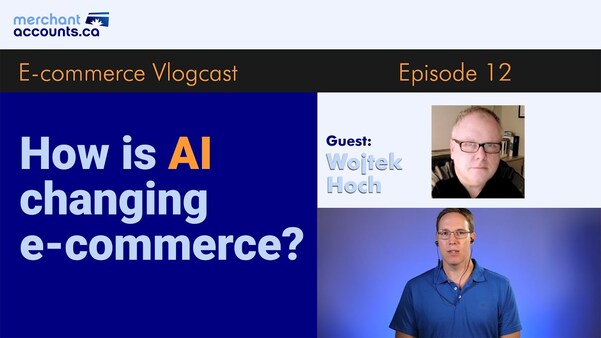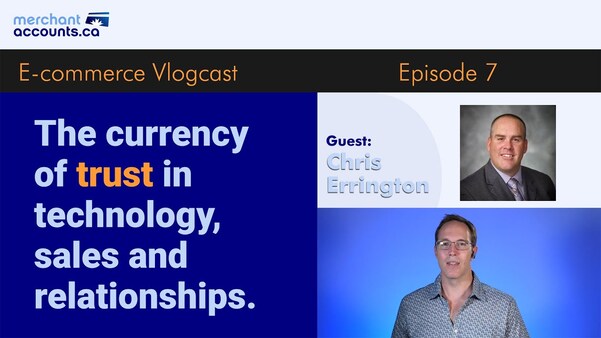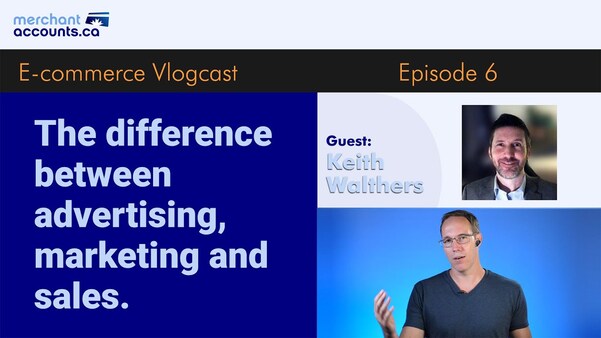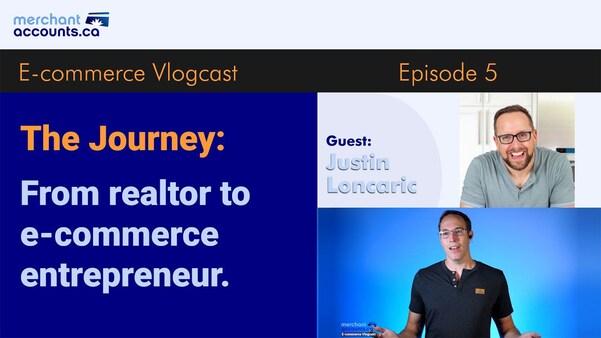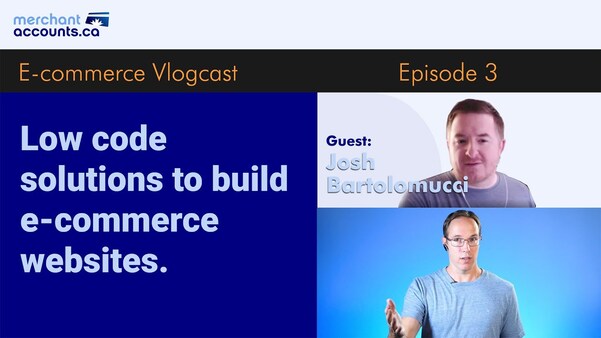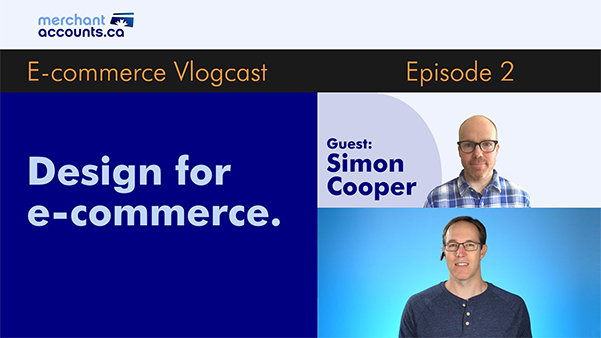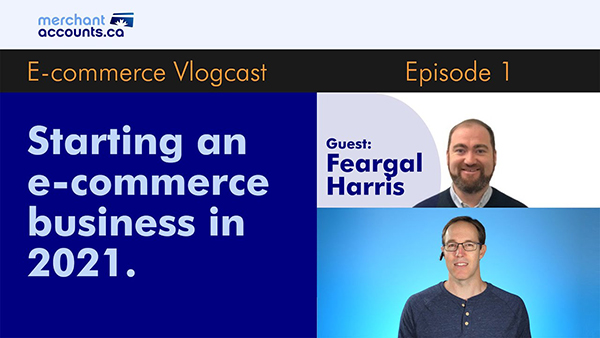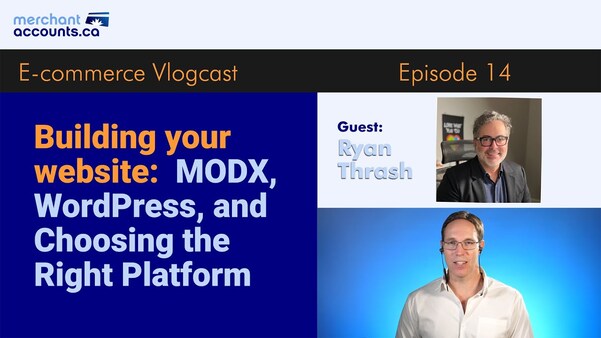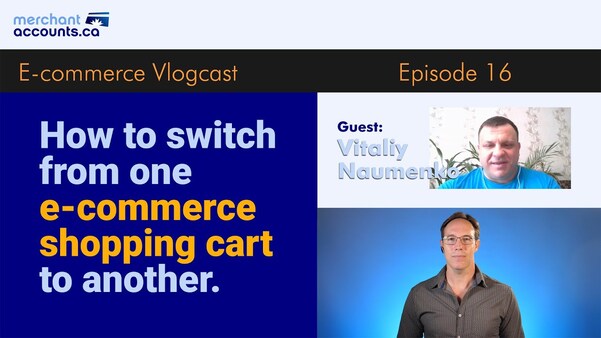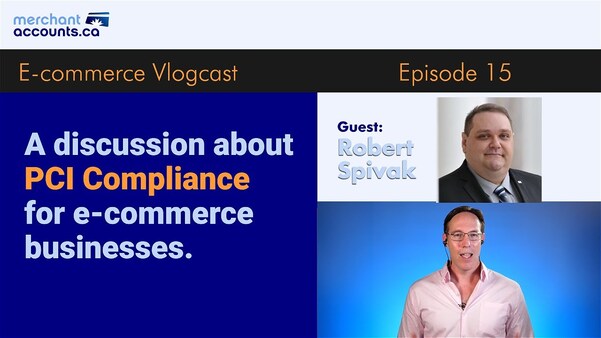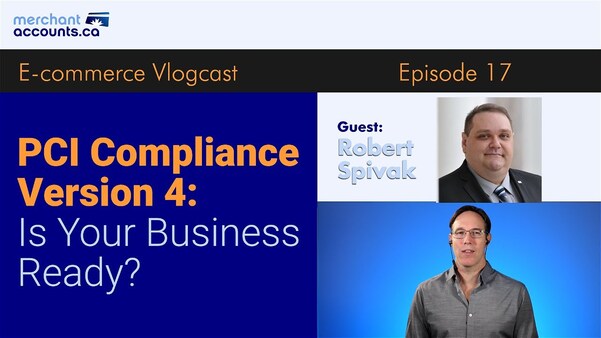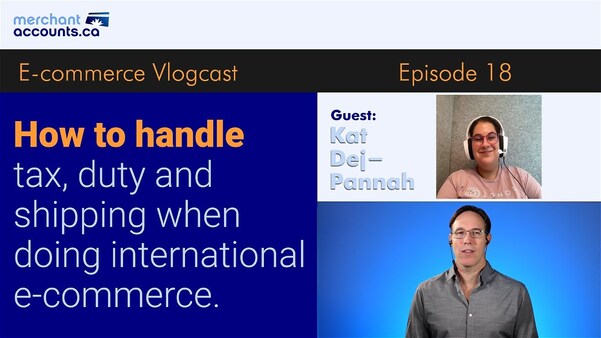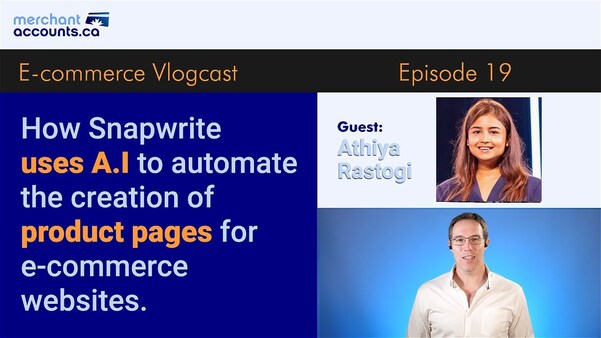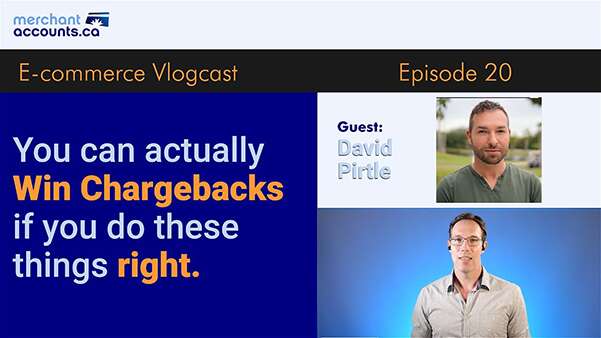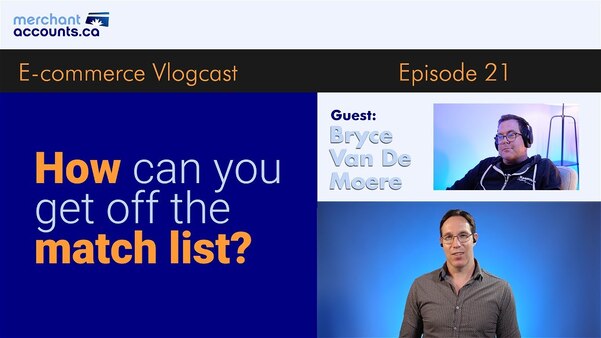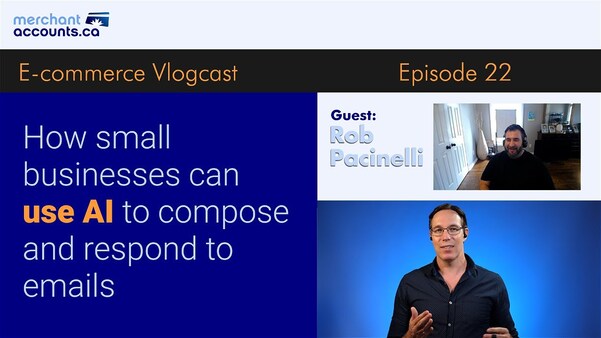March 09, 2023
by David Goodale
Building Launch Cart: E-commerce software that includes access to products to sell
(Slightly edited from video transcript for greater readability)
David Goodale:
Hello, David here at Merchant-Accounts.ca. Today I'm talking to Greg Writer, the CEO, and founder of Launch Cart. Greg has over 30 years of expertise in what I'd broadly call entrepreneurship, marketing, technology, and drop shipping-related businesses. We're going to talk a little bit about Launch Cart, which is hoping to disrupt the e-commerce shopping cart platform space, and I'm pretty sure we're going to get into some other interesting insights today as well. Greg, thanks for joining today.
Greg Writer:
Hey, I appreciate it, David. Thanks for having me.
David Goodale:
No problem. I'm just going to jump right in. My understanding is Launch Cart is a technology product built to help perhaps most of all, with not only the technology parts of e-commerce. I know that Launch Cart was built for a reason. Maybe you could start by telling me what problem Launch Cart is built to solve.
Greg Writer:
Boy, that's a good one because we solve a bunch of problems and I think, if you don't mind, I'll tell a little kind of story about how I got here because every entrepreneur has a story of the problems they experienced, which led them to try to want to create, find a solution, and then the solution doesn't exist. Let's create one.
David Goodale:
Let's hear it. I'd love to hear.
Greg Writer:
It. The short version of the story is that I started a company called Celebrity Lifestyle Brands back in 2015. The idea is that we would partner with celebrities and influencers and help them monetize their fan base through e-commerce and digital marketing and not do it as a paid-for service, but more as a partner and a trusted partner with them. As we started doing that, we started working with celebrities like Carlos Santana and Sofia Vergara and Bethenny Frankel, these celebrities doing millions and millions of dollars of e-commerce sales and we're using Shopify. Shopify's a great platform. It's come a long way, but again, you're going back to 2015, 2016, 2017, it was pretty lacking in some features of functionality and some speed and some different things. You know, we were just constantly battling and I think of myself as one of the top digital marketers on the planet.
Greg Writer:
As digital marketers, we're just constantly like, oh, let's go in, we gotta hack into the code and let's optimize this, and let's go get this app, install this app. Anyone who uses Shopify knows it's an app-driven technology, meaning you want to have customer reviews, you gotta go to the app store, search for an app, look for, look at all the apps, and try to decide which one's the best, click download, install, and pay more. It's like that for every feature. At one point we said, look, we need to create our platform so we can control the brand experience, we can do some cool stuff with these celebrities. That's what kinda led us to venture off into Launch Cart with the idea that we create a better platform that had all these features built in so that you didn't have to install a bunch of apps.
Greg Writer:
Then this part B to that story is I said, okay, well a number of my friends were doing drop shipping stuff from China and doing print on demand and things like that. I said, Hey, let's get in the drop shipping space, and let's, see how that works and then we can solve those problems. On the Shopify side, like, okay, let's eliminate this app side, let's put in the must-haves built in, and let's have a freemium model so we can lower their barrier venture of your people all over the globe. Then we said, okay, on the drop shipping side, we got into that and I tell you, I blew myself away. We came out the gate and did about a million dollars in our first month.
David Goodale:
Now Greg, just outta curiosity started cutting. How long ago was this? Because I don't know how long launch carts have been around.
Greg Writer:
This started, this is, I'm going back to 2018 right now. 2018, so from November 2018 through, August 2019, we sold 400,000 people a product drop shipping stuff from China.
David Goodale:
Wow, that's incredible.
Greg Writer:
I, you think about that, we collected 400,000 credit cards online and sold 400,000 people a product. Now the pain points of that were many, right? It's like all the vendors sending money and then the returns. It was a nightmare trying to keep track of all that. That kinda led us to want to build part two of our solution, which is the source and sell marketplace. Then to facilitate our solution, we're also getting into the FinTech world where we're incorporating banking as a service. But the pain points were just Launch Cart. I mean, Shopify with all the apps and then the source and sell marketplace was the drop shipping going, I want to drop ship stuff, but I don't want to have to pay for the money and I don't want to have, have all these problems that, that are associated with having multiple vendors. We figured banking as a service could solve all that stuff. I could paint some pictures for you, but that's kind of the overarching thing going, let's solve the efficiencies for the supply side on, what I call on-demand product sourcing. Lower the barrier of entry for people to get into the e-commerce space and make it easy not only to sell stuff online but also another additional distribution channel for the product they invented.
David Goodale:
I mean, *laugh*, I feel like there are about four podcasts worth of topics just in that, that little bit there *laugh*. But so then to me is Launch Car a platform made more for folks that are new to e-commerce? Because you're solving a lot of problems. Let me qualify this question. Some problems happen when you launch a business and some problems happen when you have a successful business that you grow into. It sounds like you're kind of addressing both. Who is Launch Cart intended for?
Greg Writer:
Well, that's a great question and again, from anybody who's listening to this who is an entrepreneur and I've coached thousands of entrepreneurs, now I am one, it's what I refer to as sequence, right? I want to be the solution to real, real brands that are doing a million dollars a month or $10 million a month. But obviously, I can't jump out the gate and be that solution. So right now we're the solution for small business owners and entrepreneurs who want to get in and start, whether it's a side hustle or an e-commerce business to start making extra money online. We make it easy for them and as we go through our lifecycle and our technology stack builds up and builds up and builds up, we start to onboard the brands. You say, okay, 18 months, 24 months from now, now we'll be onboarding bigger brands and brands that want to have a distribution channel and leverage our tech stack for efficiencies in the direct-to-consumer space.
David Goodale:
Interesting. When people are using Launch Cart, are they predominantly using your, actually maybe I'd like to talk a little bit about it, and I don't know if this is the right word. Maybe the procure product procurement side of your business or the, what, what do you call it, Greg? Then, the printer to ship or something like that?
Greg Writer:
Well yeah, you have the print on demand and the manufacturer on demand I call it on-demand product sourcing. Okay. Our sweet spot right now is like, I'm wearing a launch cart branded hat mm-hmm. *affirmative*, right. Even with your business or everybody's business, doesn't matter if you're a yoga studio, doesn't matter if you're a Dojo, it doesn't matter if you're a little league team, you're a brewery, or a bar, you're whatever it is, you should have branded merch that you can give to your clients. Your clients can buy it, they can wear it. Now you have walking billboards everywhere. Everywhere people go. Gyms are big clients of ours. Our sweet spot right now today is we help people get on onboarded, we help them have a catalog of over 400 products. They can put their logo and their brand and their designs and their sayings on.
Greg Writer:
If you're a gym, you might have some cool sayings like, I don't sweat, I sparkle *laugh*, different things like that for the women, and stuff like that. You can put your sayings and your brand on products and put it on a storefront and it looks like you did a photo shoot and it looks like you did all this kind of stuff. Now you can sell stuff. When you sell one thing, one thing is printed, and one thing is shipped. There's no minimum order quantity, there are no inventory costs and there's no fulfillment or headaches, everything is done for you. Kinda like a 360 white glove service. Our technology helps power that.
David Goodale:
Yeah. What's screaming in my mind is the words barrier to entry. I feel like you're saying what barrier to entry. Like you're kind of like Right? Making it easy to start. So how are folks coming across Launch Cart? Cuz, and, but I'll even qualify that a little bit further. I'm not super active on social media or Facebook groups, but I'm active on a couple. It always seems in the e-commerce groups, people are asking for ideas on what to sell or things like that. So how are you making, your target demographic aware of Launch Cart?
Greg Writer:
Well, that's a great question too. Again, as an entrepreneur, and again, trying to do a little coaching here as we go, cause it's just my nature is like, you have to figure out what your go-to-market strategy is and what your USP your unique selling proposition is. What is that for us? It's like, okay, we're going to have a freemium model. So now you go and say, okay, wait, I'm looking at Shopify and then I hear about Launch Cart, I go compare. I'm like, well, these guys are free. Let me give them, let me go kick the tires, let me try them out. Then it's our job to show you the tech stack that's part A. Then part B is you go to launchcart.com and you look at the footer. We have a comparison chart between us and Shopify and what we give you coming out of the gate compared to what you have to go in Shopify and go get an app for.
Greg Writer:
It's like the difference between $27 a month and $600 a month on Shopify. So now we're kinda looking at the feature set going, okay, wow, these guys come with these features, it saves me time and speed to market, which equates to money mm-hmm. *affirmative*, right? Um, and that's, and that's part of it. From that standpoint, I think that's, that's kind of our been our go-to-market strategy, those two distinguishing features. Then as we built our platform, because it was free, we had a lot of traction. Like we've had over 43,000 people set up on our platform with literally $10,000 of, marketing money in the last year.
David Goodale:
A half, two years, *laugh*. That's incredible.
Greg Writer:
That's a testament to the freemium model, right? Then, the next part of that is what, when we got to a point where we felt that we were ready, which was February of 2022, I started reaching out to what I call E-commerce influencers. These are e-commerce. These e-commerce influencers to me are somebody who teaches people how to make money by setting up and selling online. A hundred percent of 'em recommend and use Shopify. I would just reach out to them on Instagram and do a little DM and say, Hey, look, we're the new alternative to Shopify. We have a freemium model, and guess what? We have funnels built in and we have pages built in and we have upsells and down sales, and it's just like ClickFunnels, but, mergers with Shopify, and again, anybody in the digital marketing world knows what that means. They come to look at us and they come, they go, wow, this is great because I'm trying to teach a student how to make money online. If they give 'em an easier platform, launch Cart versus Shopify, their students get onboarded faster, their students get up and running faster, and their students start making money faster. A lot of 'em start switching over to Launch Cart and recommending Launch Cart. That's also driven thousands and thousands and thousands of customers.
David Goodale:
Right. It's so interesting in your answer, you answered my next question because I was going to ask, at one point you had a pretty killer platform, a pretty promising platform, and no users. How did you get the first thousand? You answered that. I'm picking up lots of, interesting tidbits along the way here. I was just going to go to my next question then. This is more of a this is a question that I think of because sometimes openly I make very bad decisions. I have a very big problem letting go of control, and I'm going to rewind the clock little ways here, but I always tended to opt more towards custom-developed or open-source software because I didn't like the idea of being painted in a corner. Of course, that comes with a million problems. Like when the server's down, it's your problem. When it's not working, it's your problem. You know, you gotta patch something, it's your problem. I'm curious to know, when you have a platform and you've identified a lot of the shortcomings of Shopify and you're trying to, to patch those holes, or patch by default those holes, how you, have you addressed kind of the balance between making something powerful in making it complex or even open? Is that how, how have you done that with Launch Cart?
Greg Writer:
No, I like that question. I've kind of done software development for the better part of 20 years. What you just described is what I call scope creep or feature creep. We try to create simple software that, an eight-year-old can use. Then as time goes on, somebody says, oh, can you do this? Oh, can you do that? Oh, can you do this? Then next thing your software's so complicated, no one uses it. I kind of think a Shopify like that, Shopify has so many, like literally 2000 different apps and you can do back flips and you can like refrigerate your Coca-Cola. I mean, you can do everything, right? Right. We said, okay, look, we're going to market with seven themes, so pick one and get launched. Okay. Right.
Greg Writer:
The number one complaint we have is, oh, you can't customize the themes like we want to. It's like, no, we're marketers, so we're about, no, you can do a beautiful side, you can be functional. Go. Right. This is some of the stuff that we're working on. So, and then we, and then my guy, my son is the director of technology. His mind thinks like this. He's like, how can I eliminate a click? How can I accomplish the same thing that, and again, of course, what we did is we reversed engineered Shopify and like, Hey, let's clone Shopify, but where can we remove a click? How can we make it easier to understand? How can we make the user interface simpler? Mm-hmm. *affirmative*, how do we go to market simpler and how do you get the merchant account set up more easier?
Greg Writer:
How do you use PayPal easier? All of these different things, right? We're constantly trying to do that because we recognize that the future is onboarding new people. Like, I'm not going to go build a big giant multi-billion dollar unicorn business, getting people to switch from Shopify. Not going to happen. I've gotta be catering to the new person coming on, getting 'em on board and growing with them and giving them the feature sets they need. One of the things that we've kind of talked about internally that answers your question directly, and this is another good marketing thing, like find out what your customers want and give it to 'em. Right? Right, right. We've said, okay, what does that mean in our world? What that means in our world is, let's put a threshold of eight out of 10. If we ask our customers, what do you want?
Greg Writer:
Eight out of 10 people would vote on that, that's a feature we need to build. But only if only five out of 10 build it, that means only 50%. At some point you're going, okay, no, let's stick to the eight out of 10 for now. Now some, some they're down the road, maybe you change that a little bit. But we know if eight out of 10 of the people go, Hey, I want Google shopping integration, we need to integrate with Google. Right? Eight out of 10 people say they want Instagram shopping integration. Okay, we better integrate, with that, right? Mm-hmm. *affirmative*. That's kind of our mode to kind of keep the scope creep or the feature creep on par with what we're doing. Interesting. Then we will take a, take a page outta Shopify's book and we will have an app store and we actually, we do have an app store and we'll allow other developers to develop apps that kind of take these features that only two out 10 want, or three out 10 want, or five out of 10 want. That way that the development cost is now born, born by somebody else. Then if that customer wants it, they can pay extra for it and get somebody else to use that or develop it.
David Goodale:
That form. It could be done if somebody said, I'm using some CRM and they just need it with enough elbow grease, it can be done. They just have to get a developer in the app store to build it.
Greg Writer:
Yeah. Okay. Yeah. Well, and again, we'll keep adding apps to help that and integration tech and zappier or stuff like that. Then kind of what you described in our space as far as open source is kind of this term of headless, right? This headless technology, meaning that I can use this code base and I can install it on my existing WordPress store, my existing, HTML coded out site, which again, for the brands that have custom stuff, and they're, they're doing millions and millions of dollars a month, they want that headless, solution. But, that's like one out of 10 or one out of a hundred. We're trying to cater to the masses. Then we're also thinking long-term going, where are the emerging markets? Well, we know Mexico's an emerging market. We know Africa is an emerging market, which is an interesting stat about Africa. Check this out. There are 1.3 billion people on the continent of Africa. Think about the United States, 330 million people. Mm-hmm. *affirmative* Africa has 1.3 billion. And guess what? 40% of those people are under the age of 17 is what I heard.
David Goodale:
Wow.
Greg Writer:
They're talking about Africa being one of the biggest G D P countries and it's just like one of the biggest consumer markets and the most explosive growth on the planet is coming in Africa because you got, *laugh*, it's 800 million people or whatever that is. Or what is it, 600 million people under the age of 17 for 15 or what it's like that, that teenage age. It's.
David Goodale:
Like, wow, that's a big, that's big on top. We're, we're, yeah.
Greg Writer:
We're looking to kind of, create technology that we can go into those emerging markets as well. Cause we're going to, we're global for.
David Goodale:
Sure. You know, my previous podcast, hasn't even come out yet, but everybody's talking about chatGPT and AI, and I'm not an expert on it. I had a programmer that was an expert in AI, and you just made me think about like, targeting people in Africa in so many different, this is just a random tangent, but you made my mouse spin in my head here using AI to, I guess dynamically rewrite content in real-time to be able to, target people basically in any language in any country around the world. Because that's if you're targeting Africa, there's a language barrier for North American merchants to do that, right?
Greg Writer:
Yeah. In some, in some places. Like, but again, there are a lot of English-speaking people in, like, Ghana, Rwanda, South Africa, it, it's all English speaking and they do have the other languages and dialects they speak, but that's like that all around the world. Like in Bangladesh and even in India. In India, there are various people that, have English over here, but they speak, in Indian over here, different languages. We're trying to target the, in English speaking, even like Mexico, right? So Mexico, Spanish, but there's a lot of English-speaking people. But again, your point is well taken and we're going to use the newest, latest technology to convert that language on, on the fly and to make that happen, as well as writing product descriptions, email marketing, abandoned cart emails, photo photos, the AI for photos mm-hmm. *affirmative*. If I have a picture of me, I'm drinking a Celsius cause I love this stuff, *laugh*, but I got my Celsius. If all I had was a, it was a Celsius can, and I wanted it in a nice tropical scenery, you can use AI to put it, in a tropical scene, right? It's all kinds of cool stuff.
David Goodale:
Happening. It's incredible. I don't think we've even figured out how it's going to be used to its fullest. Well, I'm certain we've not figured it out to its fullest. ent, but we know it's coming. So, okay.
Greg Writer:
Well, and that, that, that makes me think of, we're maybe getting ahead of ourselves, but the source, source and sell marketplace, with our funnels and upsells and down sales and our marketplace. Let's say you're a, you're my, one of my stores rescued Joe. We have a coffee company called Rescue Joe. Drink a cup, save a pup. Mm-hmm. *affirmative*, we donate money to rescue comp companies. Let's say you're shopping there and you say, oh, I'm going to buy some Rescue Joe Coffee, and I add that to my cart. Then the artificial intelligence and predictive analytics say, oh, this person also wants a French press and looking for a French press, but I don't have a French press. It's going to go to the source and sell marketplace, pull a French press out and make an offer to this customer and make an upsell for me without me doing anything, all based on AI and predictive analytics.
David Goodale:
That's so, that's so interesting. Now there's just, there are just so many places I'm out. We're already like, I think about half an hour into our discussion here, 20 minutes or something. I want to circle back to something else for one second. We can, sorry for skipping around so much, but I often No, that's fine. I often say this, if you give, a startup a million dollars for a website, you'll have a $50,000 website, $950,000 wasted. It's just because you don't know what your problems are. I think I can kind of twist that just ever so slightly to describe kind of the problem you're tackling with Launch Cart, which is, if you're new to an e-commerce business, you can have the best store in the world, but the best store on it, so on without traffic and the right copy and all. It doesn't do anything. Do you have any, and I'm talking about this also because of your background, Greg, is some element of coaching or merchant education a part of the platform or available to people using Launch Cart?
Greg Writer:
Yeah, no, that's a huge part. I'm a personal development junkie. I got introduced to Brian Tracy and Zig Ziegler and Jim Ron and Dennis Waitley and Tony Robbins when I was, 19 years old and I just turned 61. I've been consuming personal development. You can see the bookshelves behind me, *laugh*. Um, I love that stuff. I recognize that if we don't teach, and again going back to the comment I made a minute ago, I'm not going to build a really big business off getting people to switch from one platform to another. Because when you've built your house on a foundation, it's hard to move that house off a foundation, right? I gotta cater to new people. Catering to new people, my success is directly correlated to their success. I have two full-time seven-figure trainers that teach every week, and then I have four part-time trainers that also train every week. We teach everybody from how to set up funnels, and how to set up pages to how to find designs, how to do marketing, how to do social media, everything from A to Z on how to drive traffic to your store and convert sales, convert sales on.
David Goodale:
Your store. Wow. Are some of that content we do a lot of part of the freemium model? Or is that a payment option?
Greg Writer:
Some of it's both. We do, we have, we have a lot of freemium, training content that goes with it because that's part of our strategy to get you to be, to go from a freed account to a paid account mm-hmm. *affirmative*. But then also we do some more, people buying access. Well, they do pay a premium to get access more on an intimate basis where I'm stuck, I want you to talk to me and we have like some few closed Facebook groups and we have a thing called Launch Academy. And Launch Academy costs $97 a month. Through there you get involved with a different group of people and you can get, a little bit more access to our team and get questions directly answered for what.
David Goodale:
You're doing. Interesting. So maybe I'm going to ask you a question. This is not a launch cart question, but I tend to like questions like this even if they're a little bit silly. But, and this is probably too broad, you're allowed to shoot this question down, but what are some of the most critical features if you're launching a new e-commerce business? Like what, what are maybe the three things that you should have top of mind?
Greg Writer:
Top of mind is speed, page load speed, right? A lot of times people will build their stores with all these graphics and they don't optimize their graphics. Mm-hmm. *affirmative* or they go to Shopify and they install 13 plugins and every plugin slows down their store page load speed is critical for mobile, for Google, for SEO, for everything. So page load speed and optimizing your site for page load speeds is number one. Number two is building trust. You like the number one reason people don't give, buy from your stores. They don't trust you. It's like, who is this guy? Am I going to get it? If your store looks crappy and your branding looks crappy and your navigation is crappy, they're not going to trust you. They might like your product, but they're not going to trust you. You have to do things, from a visual standpoint, from a navigation standpoint, from all that kind of to make, to build trust.
Greg Writer:
For instance, one little side notes there is we have the only e-commerce platform that I know of that allows you to edit the checkout page. The checkout page is the most critical because that's where they're giving you the credit card, right? We allow you to add trust, seals, testimonies, and things on the checkout page to help increase trust to close that sale. I think the third thing would be, would be, so I got the trust, I got the page load speed. Then I think, I think the other thing would just be.
David Goodale:
That were two awesome ones. Greg. You don't, you don't owe me a third. Those *laugh*. Yeah.
Greg Writer:
No, I don't know. Yeah, I was going to say, I don't know if, if the if that's, that's kind of what I would focus on.
David Goodale:
Right? Trust because fear of purchasing I when you were, because if people are afraid to purchase and how do you overcome, maybe I'll dig in just a little bit better because I think that's such a good one. You talked about a bit, tell me how to overcome the customer's fear of purchasing.
Greg Writer:
It's about, it's about yours, your story. Like again, let's take Rescue Joe as an example, right? If I have a rescue Joe, who am I targeting? I'm targeting coffee lovers and coffee fanatics who are also rescued dog fanatics. Mm-hmm. *affirmative* or re so Coffee Joe. Cause that, that, drink a cup of Joe that's, it's a play off of a, of a slang word. Mm-hmm. *affirmative*, right? So now if I have that customer journey and I have an, and I don't have an about us page talking about why we're doing this and who we are and how we thought of this and how we're going to donate enough money to charity. But see, I can create a story out of that. How this is, everyone should be selling in stories and authentic stories, not made-up baloney stories.
Greg Writer:
That story of, Hey, I have rescue dogs and I've had 'em, my whole, I've had 'em my whole life. I've also bred other kinds of dogs. I love dogs and I drink coffee every day. I'm like, what a great combination, of dogs and coffee. So now I can start to create messaging that, that supports that issue and that agenda and I'm telling a story along those lines. That's part A every brand and every online store should have a story, right? Then part B would be, what can you do to your website that instills trust? That makes it look like a store, make it looks professional, have a nice-looking logo. I can't tell you how many thousands of people stores on our platform where people put up a logo. It's like, it looks like a fifth grader, or five-year-old made it with a crayon or something.
David Goodale:
There's like anti-alias thing around it and it just looks bad. I know exactly what you are.
Greg Writer:
Mean. It's blurry. It doesn't, there's nothing, it's nothing to, it's wrong. Just everything about that. Then, and then again, we're digital marketers. We've done things called AB split testing and AB split testing where you send, your traffic to one page, to another page, one page. You use different colors of buttons in the trust seal. Like on our checkout page, we recommend you put a trust seal. What's a trust seal Trust deal says a hundred percent satisfaction is guaranteed. We'll give you your money back, no questions asked. Or it might say, we're our site is secure SSL and it's, and it takes MasterCard just by putting an SSL and we accept MasterCard Visa credit card that increases your conversions by two or 3%. These little things, and like in my stores, I put a phone number on the checkout page. Got any questions? Call now we're answering.
David Goodale:
The phone. Exactly.
Greg Writer:
I've never got a, I've never got a phone call, but that increases trust. I Right. Then of course you have to have your privacy policies, your refund policies, those kinds of things front and center so you look real. Then, and then you need to have social media. It's like, I want to buy this rescue Joe, but are they real? Are they legit? They click on my Instagram link and they go, oh, there's a bunch of posts. Oh, they're, they click on my Facebook link. Oh, there are a bunch of posts. They click on my LinkedIn, oh, I see these guys are real, okay, I'm going to go back and buy.
David Goodale:
Exactly.
Greg Writer:
Because everybody's doing their research these days. These are the things you have to do. Do.
David Goodale:
You agree with me that the web has become far more personal because like, I'm going back some ways here, but it used to be at X, Y, Z incorporated, we are committed to the greatest of, blah, blah. Now I think it's more like, Hey, I'm Dave, I started this company, here, here's me. When you're talking about like, on the checkout page, I think the more human that you let people know, you, you let people see the humans behind the business. I think that's what you're lacking in that technological interaction. Uh, do you, do you encourage that with people, using launch cards or just your other people that you're coaching?
Greg Writer:
No. Every, every day, every day we say it this way, people want to buy from people. Yes. Right. People don't necessarily want to buy from corporations. Corporations are being poo-pooed everywhere. The woke corporations, the cancel corporations get the jab, or your fired corporations mm-hmm. *affirmative*, all that kind of stuff. If you come out and say, I'm an entrepreneur, I'm a work-at-home mom, I've done this, I've done that, here's what I'm doing. I would love your support. There's going to be a certain faction of people that want to support you. Especially with the celebrities and influencers, more and more and more, people want to buy from people that they have an influence on or they, they like and they love. Right. Who do they like and love As you start to get, if you're the kind of person that is a content creator, right? People learn to like and love you because of the content that you're.
David Goodale:
Creating. I feel like they know you.
Greg Writer:
Why not give them Yeah. They do know you, right? Mm-hmm. *affirmative*. Why don't give them something to buy to help support you? Right. That's not the case with everything. But whether you're a grandma that's, that's selling some of her, knitted stuff or she makes socks or knits, blankets or something they want to buy from people like that. It, it, and again, my youngest daughter has a site called Dope Mamas *laugh*. I'm 61, and I'm like, no, don't, I don't even know what a dope mama is, but she says, it's a cool mama. And she goes, dad, everyone my age knows what that means, *laugh*. Cause I'm like, okay, that doesn't mean the same thing as that when I was your age. Right? But, that's who she attracts. Then other mamas want to support her and they want to have, they want to wear the shirts and they want to get the stuff and they want to buy stuff from her because she, like, they resonate together. So, and just like with the rescue Joe, if you're a coffee fanatic and a rescue Joe fanatic and I post good content and I share cool stuff, you're going to learn to, love, like, and trust, and by pro byproduct.
David Goodale:
Byproducts. That's so interesting. I think you just helped me, I already kind of had that figured out, but I think what you just made me feel or think is for small companies, maybe this doesn't apply to Sony or Virgin or something, but behind small companies are the individual and you're trying to communicate who that is. I think that's amazing advice. Interesting. What if I.
Greg Writer:
You know, and I like to remind entrepreneurs this, Nike started in a dorm room, right? Mm-hmm. *affirmative*, every brand you can think of, Tommy Hilfiger and all these different brands, all started somewhere with somebody's idea, right? Is that going to be you, do you have the aspirations to build an online, excuse me, an online brand that can be that significant mm-hmm? *affirmative*, right? But they all started somewhere. Don't, don't throw in the towel that you're not building something that could be something significant.
David Goodale:
Interesting. I, and totally, totally like Michael Dell and just a million, a million examples, however, many successful companies are. There are that many examples. So now I'm going to flip the script exactly just a tiny bit. We're, we've talked about startups, this is maybe not related to Launch Cart, but I think you're still going to have, I think this is related to Launch cart. I'll just ask my question. What are, what things are people not thinking of long term? Yes, you gotta go live, you have to build trust, and you have to get some sales, but then you hit the glass ceiling over your head. What problems have you seen businesses not anticipate that could have been relatively or reasonably easily avoided?
Greg Writer:
Well, that's a good one. I love that question. Two, it's like, invest in a coach, invest in a mentor, invest in a consultant that's been there, done that. Like, like find the people that can save you time, save you money, and save you from getting your leg blown off from a landmine you just stepped on. Mm-hmm. *affirmative*, right? That's number one. Number two, the most important thing with any business that's built of significance is your team. That is, so you get through number one, going, let me pay somebody to help me eliminate the landmines and maneuver the landmines and get there faster and get there more efficiently. Number two, and this has going to be one of my weaknesses, so I can speak this firsthand, is, hiring the right people. Because I'm one of these guys, I don't like the hiring process, I don't like the interview process.
Greg Writer:
It's like, you're warm, you're alive, you're hired, like, *laugh*, I'm fast to hire and slow to fire and my coach and I coach people, they'll be the opposite. Be slow to hire and fast to fire because everything is about the team and everything's about, I like that analogy of like, you're trying to build, something significant, think of a chain, right. You have the links in a chain and each link goes to somebody else. Social media links, YouTube links, Instagram links, e-commerce, link, bookkeeping link, finance, link money links accounting, link books, and even taxes. All those are big, and if one person's not doing their job properly, it affects everybody else in some manner or form. It takes, it beats into your profit margins.
Greg Writer:
Then my third thing to all of that said, you get that going. You got that going. Then, I like to teach the leaky bucket syndrome. Every business I've ever consulted, and every coach ever worked with has leaky buckets everywhere. Mm-hmm. *affirmative*. As the CEO and the mentor and the founder, you want to come back and kind of look at, okay, where can I set up SOPs, standard operating procedures, how can I fix this leaky bucket? Where's this leaky bucket going? Where's this money falling out here? Where's this happening here? We all have them. You constantly have to put 'em on your calendar and concerted effort and time to go through your operations, going through your books, go through everything and find the leaky buckets and plug some holes and optimize things. It's always track and optimizes, track and.
David Goodale:
Optimize. Amazing, amazing advice. There's, I, we won't be able to go as far as I want to go in this discussion, Greg. I just kind of, apologize for hopping around so much, but I want to steer back now towards launch Cart, but a little bit from my area. I'm Canadian, and a lot of our customers at Merchant Accounts dot Sierra Canadian, but not just Canadian, but anyways, because for, Canadian merchants, the currency is a bigger issue because Canadian dollars is very important to Canadian merchants, but then the US market is 10 times as big. So for a Canadian merchant, the multicurrency capability is an important consideration. Is Launch Cart multicurrency capable that would let you charge per currency to customers in different regions or countries?
Greg Writer:
Yes, it is. That was one of the biggest lifts. When I say lift mean, when I talk about software development, it was one of the most difficult software development pieces of the puzzle that we created. But we have companies, we have people in 182 different countries and I think we're in like 190 different currencies or whatever it is. It's a lot. When you go to Launch Cart and you're in a different country, you can set up your default currency to whatever default currency you want. But let's say, let's say I set up my default currency as U S D and you come in from Canada, it's going to recognize your IP address and it will display the prices on the site in Canadian dollars. If I set it up that way, or if it's in Mexican pesos, I could do that. Whatever currency your IP is recognizing you coming in from what country, it can display the product prices in that currency. But you have to set it up in the background.
David Goodale:
Perfect. And can it, can you, this is, I was also in a second going to ask what payment gateways you support. This is kind of a related question. If a merchant was using, PSI Gate in Canada and authorized net in the States just as an example of two Countries with two domiciled corporations, and they want to write their transactions domestically because you lower your interchange costs and you reduce your declines when you process your transactions domestically, can, is Launch Cart able to be configured to say, Hey, launch cart for Canadian customers, process them here, US customers use Stripe or use Authorize.net or something like that?
Greg Writer:
Well, see now you're getting into a world that I'm not familiar with. That's your world. But I'll say this. We first integrated and launch Stripe because that's that middle piece of middleware that makes it easy for anybody to set up a merchant account and there's no approval process. Mm-hmm. *affirmative* and they don't approve you until you start making sales and they typically will hold your money and whatever. Uh, and then we integrated with PayPal next. Then from there, I integrated with a company called NMI, which NMI is like an authorized.net. You can use authorized.net through NMI, but it's this huge 180 billion, company. It doesn't, it pretty much doesn't matter if you're Chase Merchant Services or Bank of American Merchant Services or whoever you are, you can use the NMI integration we did to route the orders to your, merchant account.
David Goodale:
Interesting. I'll help you out a bit there. Integrated NMI is multicurrency capable, Euro Sterling, Canadian Dollar, and US dollars and probably others, but I know for sure it handles those four currencies just so your Pro Protect perspective users know.
Greg Writer:
Yeah. Right. Then we integrated with this company called, open Node, which allows us people to accept Bitcoin. Oh, cool. It's kind of cool because if you want to accept Bitcoin, but you want to get 50% of your money and whatever currency you want, you can say, okay, I want to accept Bitcoin, but I need you to convert to U S D, let's say, and it'll convert at the point of purchase 50% to U S D and they keep 50% in Bitcoin, or I can do 70 30, 80 20, I can have this little slider bar, I can do whatever I want. Um, and then we integrate with another company called Revere Payments. Revere Payments is like a Patriot Christian-based, patriot friendly that a lot of people have been getting canceled with Shopify, canceled with PayPal, canceled with Stripe. There's a whole movement of people that want to use merchant account providers that aren't quote-unquote "anti woke". From my stat perspective, I'm agnostic going, look, I'm a free enterprise capitalist guy. You use whatever you want to use and just pay me my little $27 a month to $297 a month to use ours.
David Goodale:
Platform. Right. *laugh*. Right. No, that makes, that makes sense. I have another question that I ask, perhaps you've already answered this one, but I usually ask people if you're, well, you already said your daughter has a business, but I, the question that as I ask it is if your daughter was opening her first company, say she's 25 years old, it could be e-commerce related or even traditional brick and mortar related, do you have a secret weapon, like secret advice that you would give to that business owner when they're going to open their first business?
Greg Writer:
Well, that's a good one. You know, so because there's this fine line of, people who want to be an entrepreneur that isn't cut out for it. Again, you've seen motivational videos online that you have to be obsessed with your vision and your dream. Mm-hmm. *affirmative* otherwise it's so hard to succeed. , and then, what a lot of people do is quit their job to be an entrepreneur and just create another job for themselves which has a lot of stress. Mm-hmm. *affirmative*. You really gotta think through, your goals and what you want to do and plan it all out. I do love e-commerce because it's such a lower barrier to entry. You know you used that word ear or that we used that word earlier I think, but it lowers the barrier of entry.
Greg Writer:
Even for the like 12-year-olds and 15-year-olds, it teaches them, Hey, I'm going to sell a T-shirt for 20 bucks. I'm going to pay $10 for it. I got a $10 profit. Well not really, because you have your merchant fees, your Mer, MasterCard, and Visa merchant fees. You got, I got shipping fees in there and then I, and then 1% of my, gives refunds. It teaches them just the basics of, selling and buying and accounting and bookkeeping and gives them the idea to understand, how to build a business. But I think the best advice goes back to, getting a coach, getting a mentor, spend a lot of time learning a skillset. I always tell people, how do you beat inflation skillset? What do you mean by skillset? The more skillsets you have, the more you can demand your service and what you do. It's the only way to beat inflation.
David Goodale:
That makes total sense. There are days when I, when I'm like, man, if I was just like a bean farmer, I could just plant my crops and watch them grow. Because there's a little bit in technology, it's a little bit of like the iPhone killer, this killer you. It's a little bit of a treadmill. But then again, if I was a bean farmer in about 45 minutes, I'd, I'd be going crazy. I just, love to learn. You just have to embrace it. And like you said, be honest with yourself. Is this who you are? If so, chase after it and give it all you've got.
Greg Writer:
Right. Awesome.
David Goodale:
Right. Greg, if people wanted to learn more about Launch Cart, if they want to get in touch with you, where can they go?
Greg Writer:
Really? It's simple to LaunchCart.com and it's, again, it's launched like you're launching a rocket ship and cart, like your shopping cart, launchcart.com, our social media handles on Instagram and Facebook are LaunchCart, LinkedIn at Launch Cart. Then mine is Greg Ryder. My last name is spelled uniquely. It's w r i t e r, like a typewriter. Mm-hmm. *affirmative* like an author. That's my handle just about everywhere as well. I've been online for a long time, so there are a lot of videos and a lot of content. Not hard to find me. It hit me up.
David Goodale:
Greg, I have loved this discussion and I just want to thank you so much for coming on.
Greg Writer:
Today. No, I appreciate it. I appreciate you and I appreciate everyone listening to this. If you're, if you've got through this, I got one last piece of advice for you mm-hmm. *affirmative*, and that does what I do, wake up every day with an attitude of gratitude, then find somebody and tell 'em you'll love 'em. I promise y'all a better.
David Goodale:
Day. That's amazing. Amazing. Thanks so much, Greg. Have an awesome day there.
Greg Writer:
All right, thank you, sir.
Need professional guidance?
Contact us for a free one hour consultation.
Can I Help Lower Your Processing Fees?
If you found this content helpful, will you give me the opportunity to quote on your business?
View Rates


